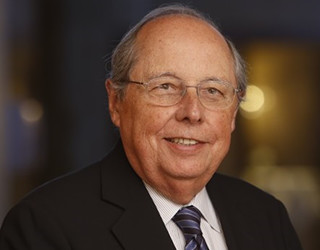
Guillermo Calvo directs SIPAs mid-career Program in Economic Policy Management.
Calvo's main field of expertise is macroeconomics of emerging market and transition economies. His recent work has dealt extensively with capital flows and balance-of-payments crises in emerging market economies. He has published several books and more than 100 articles in leading economic journals.
Calvo's recent positions include: Director of the Center for International Economics and Distinguished University Professor at the University of Maryland; Chief Economist at the Inter-American Development Bank, Senior Advisor in the Research Department of the International Monetary Fund; and Research Associate at the National Bureau of Economic Research (NBER). In addition, he is a member of the Academia Nacional de Ciencias Económicas, Argentina, and a fellow of the Econometric Society and the American Academy of Arts and Sciences.
Calvo is the former President of the Latin American and Caribbean Economic Association (LACEA), and the current President of the International Economic Association. Calvo has testified before the United States Congress on dollarization and on the 1994 Mexican crisis and has served as an economic advisor to several governments in Latin America and Eastern Europe. He has received Honors including the Simon Guggenheim Foundation Fellowship in 1980-1981 and the King Juan Carlos Prize in Economics in 2000. Calvo is returning to Columbia, where he was a member of the faculty from 1973 to 1986.
Calvo received his PhD at Yale in 1974.
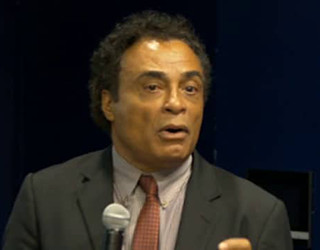
Pierre-Richard Agénor is the Hallsworth Professor of International Macroeconomics and Development Economics, University of Manchester, and Co-Director of the Centre for Growth and Business Cycle Research. He has published widely in leading professional journals and made contributions to a wide range of fields in economics, including international macroeconomics, development economics, growth theory, labor economics, and poverty reduction. He is the author of The Economics of Adjustment and Growth (Harvard University Press), Development Macroeconomics (with P. J. Montiel, Princeton University Press), and more recently Public Capital, Growth and Welfare (Princeton University Press).
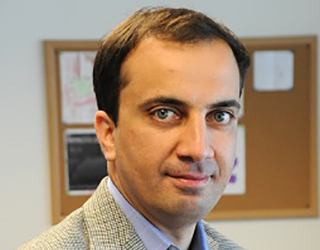
Eduardo Cavallo is currently a Senior Economist at the Research Department of the Inter-American Development Bank (IDB) in Washington DC. Prior to re-joining the IDB, Eduardo was a Vice-President and Senior Latin American Economist for Goldman Sachs in New York. Eduardo had already worked at the IDB as a Research Economist between 2006 and 2010. He holds a Ph.D. in Public Policy and an MPP from Harvard University, and a B.A. in Economics from Universidad de San Andres (UdeSA) in Buenos Aires, Argentina.
He has been a research fellow at the Center for International Development (CID), a visiting scholar at the Federal Reserve Bank of Atlanta, a member of the faculty at the Kennedy School of Government's Summer Program. In Argentina he co-founded Fundación Grupo Innova. His research interests are in the fields of international finance and macroeconomics with a focus on Latin America. He has published in several academic journals, and is the co-editor of the IDB book, Dealing with an International Credit Crunch: Policy Responses to Sudden Stops in Latin America.
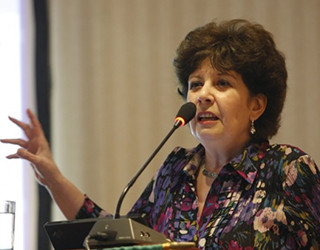
Liliana Rojas-Suarez is a senior fellow at the Center for Global Development with expertise on Latin America and on financial services and the development impact of global financial flows. Her most recent book is Growing Pains in Latin America: An Economic Growth Framework as Applied to Brazil, Colombia, Costa Rica, Mexico, and Peru.
She is also the chair of the Latin American Shadow Financial Regulatory Committee (CLAAF). From March 1998 to October 2000, she served as managing director and chief economist for Latin America at Deutsche Bank. Before joining Deutsche Bank, Rojas-Suarez was the principal advisor in the Office of Chief Economist at the Inter-American Development Bank. Between 1984-1994 she held various positions at the International Monetary Fund, most recently as deputy chief of the Capital Markets and Financial Studies Division of the Research Department. She has been a visiting fellow at the Institute for International Economics and has also served as a professor at Anahuac University in Mexico and an advisor for PEMEX, Mexico's National Petroleum Company. Rojas-Suarez has also testified before a Joint Committee of the U.S. Senate on the issue of dollarization in Latin America. She has published widely in the areas of macroeconomic policy, international economics and financial markets.
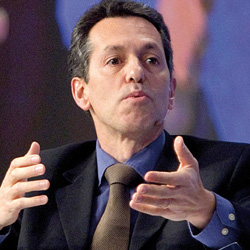
Alejandro Izquierdo is currently a Principal Economist at the Research Department of the Inter-American Development Bank. Previously he worked at the World Bank in the Department of Economic Policy, and taught courses on macroeconomics and international finance at several Latin American universities. He holds a Ph.D. in Economics from the University of Maryland, an M.S. from Instituto Torcuato Di Tella, Argentina, and a B.A. in Economics from Universidad de Buenos Aires, Argentina.
Alejandro has several publications in professional journals and edited volumes. His current research interests include issues in international finance such as the role of external factors on growth, the relevance of balance-sheet effects and financial integration in determining the likelihood of experiencing Sudden Stops in capital flows, as well as how countries recover from output collapses following Sudden Stops. He has also worked on the impact of Sudden Stops in the variance of relative prices, fiscal sustainability under Sudden Stops, and amplification effects of collateral constraints on the real exchange rate and output. Additionally, he has conducted research on the impact of macroeconomic external shocks and public expenditure allocation on poverty reduction for developing countries using computable general equilibrium models.
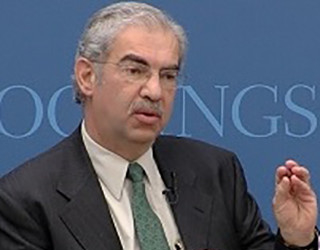
Santiago Levy Algazi became the Vice President for Sector and Knowledge on March 1, 2008. From August 2007 to February 2008, he served as General Manager and Chief Economist for the IDB Research Department.
Previously, he was General Director at the Mexican Social Security Institute (IMSS) from December 2000 to October 2005. Under his tenure, he promoted changes to the Social Security Act to increase transparency and accountability in IMSS finances and create long-term reserves.
From 1994 to 2000, Levy served as the Deputy Minister at the Ministry of Finance and Public Credit of Mexico, becoming the main architect of the renowned social program Progresa-Oportunidades that benefits the poor. He managed budgetary adjustments during the 1994-95 economic crisis and the 1998 fall in oil prices. Previous positions include President of the Federal Competition Commission and Director of the Economic Deregulation Program at the Ministry of Trade and Industrial Promotion.
Levy holds a Ph.D. in economics from Boston University and a Masters in political economy from the same university. He was a post-doctoral fellow at Cambridge University.
Levy has advised several governments and international organizations and has held several teaching positions, including faculty positions at the Instituto Tecnológico Autónomo of Mexico and Boston University, where he was Associate Professor and Director of the Institute for Economic Development.
He is the author of at least 75 articles, monographs and book chapters on such diverse subjects as poverty reduction, competitiveness, foreign exchange policy, export imbalances, pricing, microeconomics and energy. His paper Poverty in Mexico won the 1992 National Research Prize in Economics awarded by the Bank of Mexico.
Other honors include the 1992 Latin American Economics Prize by El Trimestre Económico for the article "Tipos de Cambio Múltiples y Racionamiento de Divisas" (with Roberto Rosales); the Research Award of the World Bank for "Assessing the Mexico U.S. Free Trade Agreement" (with Anthony Venables and Sweder Van Wijnbergen); and Honorary Mention, 1986 National Research Prize in Economics by Banco Nacional de México for the article, "Respuestas de Corto Plazo ante Crisis de Divisas."
His recent published books are Good Intentions, Bad Outcomes: Social Policy, Informality and Economic Growth in Mexico, Brookings Institution Press, 2008; Progress against Poverty: Sustaining Mexico’s Progresa-Oportunidades Program, Brookings Institution Press, 2006; Sin Herencia de Pobreza, Editorial Planeta, 2005 (with Evelyne Rodríguez); and Ensayos sobre el Desarrollo Económico y Social de México, Fondo de Cultura Económica, Mexico, 2004.
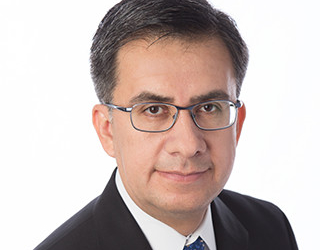
Enrique G. Mendoza, Professor, joined the Maryland faculty in January 2002 after spending 8 years in Washington at the International Monetary Fund and the Board of Governors of the Federal Reserve System and 5 years at Duke University. He is also a Research Associate of the National Bureau of Economic Research. He received his PhD from the University of Western Ontario in 1989. His main areas of specialization are international macroeconomics and finance. His research focuses on international capital flows, financial crises, sovereign debt and international business cycles. Publications include: "Precautionary Demand for Foreign Assets in Emerging Economies: An Assessment of the New Mercantilism," (with C. B. Durdu & M. Terrones), Journal of Development Economics, forthcoming, 2009. "International Evidence on Fiscal Solvency: Is Fiscal Policy 'Responsible'" (with J. Ostry), Journal of Monetary Economics, 2008, "Lessons from the Debt-Deflation Theory of Sudden Stops," American Economic Review, 2006, "Rational Contagion and the Globalization of Securities Markets'' (with G. Calvo), Journal of International Economic, 2000, "The International Ramifications of Tax Reforms: Supply-side Economics in a Global Economy" (with L. Tesar), American Economic Review, 1998, "Mexico's Balance of Payments Crisis: A Chronicle of a Death Foretold" (with G. Calvo), Journal of International Economic, 1996."Real Business Cycles in a Small Open Economy," American Economic Review 1991.
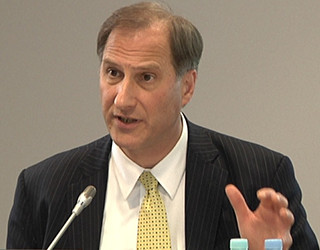
Charles W. Calomiris is Henry Kaufman Professor of Financial Institutions at the Columbia University Graduate School of Business and a Professor at Columbia's School of International and Public Affairs. He is a member of the Shadow Financial Regulatory Committee, the Shadow Open Market Committee, and the Financial Economists Roundtable, and a research associate of the National Bureau of Economic Research. Professor Calomiris was a senior fellow at the Council on Foreign Relations and now is a member of the Task Force on Property Rights at the Hoover Institution, and the Pew Trusts Project on Financial Reform. He co-directed the Project on Financial Deregulation at the American Enterprise Institute for over a decade. Professor Calomiris served on the International Financial Institution Advisory Commission, a Congressional commission to advise the U.S. government on the reform of the IMF, the World Bank, the regional development banks and the WTO.
His research spans several areas, including banking, corporate finance, financial history, monetary economics and economic development. He received a BA in economics from Yale University in 1979 and a PhD in economics from Stanford University in 1985.
Professor Calomiris is the recipient of research grants or awards from the National Science Foundation, the World Bank, the Japanese Government and others. He serves or has served as a consultant or visiting scholar for the Federal Reserve Banks of New York, Chicago, Cleveland, St. Louis, and Philadelphia, the Federal Reserve Board, the World Bank, the governments of Mexico, Argentina, Japan, China, El Salvador, Brazil, Colombia, Connecticut and Massachusetts and various private sector clients.
Recently, Professor Calomiris has co-designed Columbia Business School partnership programs with the University of Dar Es Salaam and the US International University in Nairobi, and teaches in both those programs. His recent speaking engagements include keynote speeches at the annual research conferences of the European Central Bank, the IMF, and Kansas City Fed Jackson Hole Symposium, the Central Bank of Chile, the Brazilian Bank Association and the Cayman Business Outlook, among others.
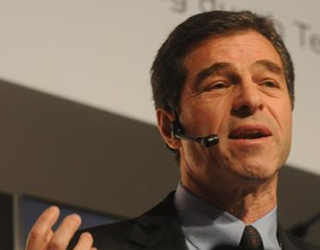
Ernesto Talvi is a nonresident senior fellow in the Global Economy and Development program at the Brookings Institution. He also serves as the director of the Brookings Global-CERES Economic and Social Policy in the Latin America Initiative, and as a visiting professor at Columbia University in New York. His work focuses on emerging markets macroeconomics with special emphasis on Latin America, stabilization programs, fiscal policy, capital flows and financial crises.
Dr. Talvi has extensive experience in economic policy. Between 2001 and 2011 he was a special advisor to the Research Department of the Inter-American Development Bank (IDB) on global and regional macroeconomic and financial affairs, contributing to the policy dialogue and the development of cross-country research work. Between 1995 and 1997 he served as a senior research economist at the Research Department of the Inter-American Development Bank. He was also a visiting scholar at the Research Department of the International Monetary Fund (IMF) in 1994.
Dr. Talvi also served as the chief economist and head of research of the Central Bank of Uruguay between 1990 and 1995. During that period, he was the chief advisor to Uruguay’s economic team (integrated by the Minister of Finance, the Governor of the Central Bank and the Director of Planning and Budget) and was in charge of the negotiations with the IMF. He was a professor of International Economics at the Universidad ORT in Uruguay and visiting lecturer at Universidad Torcuatto di Tella in Buenos Aires, Argentina. Finally, he is a founding member of the Latin-American Shadow Financial Regulatory Committee and was a member of the Executive Committee of the Latin American and Caribbean Economic Association.
Dr. Talvi has published several academic and policy papers in books and journals. He has a Ph.D. in economics and an M.B.A. in finance from the University of Chicago and a B.A. in economics from the Universidad de la República Oriental del Uruguay.
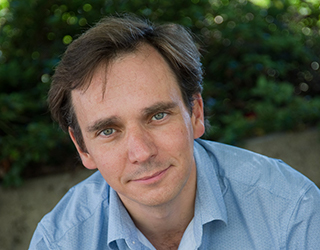
Pierre-Olivier Gourinchas grew up in Montpellier, France. He attended Ecole Polytechnique then received his PhD in Economics in 1996 from MIT. He taught at Stanford Graduate School of Business and Princeton University before joining UC Berkeley department of economics.
Professor Gourinchas' main research interests are in international macroeconomics and finance. His recent research focuses on the importance of the valuation channel for the dynamics of external adjustment and the determination of exchange rates (with Hélène Rey); on the determinants of capital flows to and from developing countries (with Olivier Jeanne); on international portfolios (with Nicolas Coeurdacier); on global imbalances (with Ricardo Caballero and Emmanuel Farhi), on international price discrimination (with Gita Gopinath, Chang-Tai Hsieh and Nick Li) and on the global financial crisis (with Maury Obstfeld). He is the laureate of the 2007 Bernàcer Prize for best European economist working in macroeconomics and finance under the age of 40, and of the 2008 Prix du Meilleur Jeune Economiste for best French economist under the age of 40. In 2012-2013, Pierre-Olivier Gourinchas was a member of the French Council of Economic Advisors to the Prime Minister.
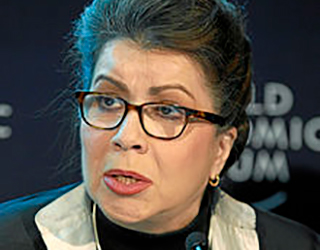
Carmen M. Reinhart is the Minos A. Zombanakis Professor of the International Financial System at Harvard Kennedy School. Previously, she was the Dennis Weatherstone Senior Fellow at the Peterson Institute for International Economics and Professor of Economics and Director of the Center for International Economics at the University of Maryland. Professor Reinhart held positions as Chief Economist and Vice President at the investment bank Bear Stearns in the 1980s. She spent several years at the International Monetary Fund. Reinhart is a Research Associate at the National Bureau of Economic Research, and a member of the Congressional Budget Office Panel of Economic Advisers and Council on Foreign Relations. She has served on numerous editorial boards, has testified before congress, and was listed among Bloomberg Markets Most Influential 50 in Finance, 2011. She received her Ph.D. from Columbia University.
Reinhart has written on a variety of topics in macroeconomics and international finance and trade and her papers have been published in leading scholarly journals. Her work has helped to inform the understanding of financial crises for over a decade. Her best-selling book (with Kenneth S. Rogoff) entitled This Time is Different: Eight Centuries of Financial Folly(Princeton Press) documents the striking similarities of the recurring booms and busts that have characterized financial history and has been translated to 20 languages and won the 2010 Paul A. Samuelson TIAA-CREF Institute Award, among others.